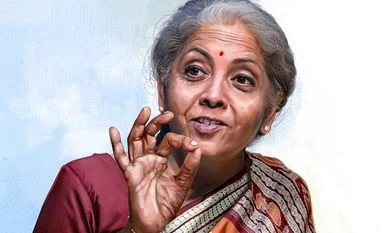Union Finance Minister Nirmala Sitharaman said on Friday that India had already started buying discounted crude oil from Russia and has received 3-4 days worth of supply.
Speaking at the India Business Leaders Awards, Sitharaman also said that she was entering financial year 2022-23 (FY23) with “cautious optimism” at a time of global commodity price escalation due to the Russia-Ukraine war.
“We have received quite a number of barrels. I would think about 3-4 days of supply. I would put my country’s national interest and energy security first. If fuel is available at a discount, why shouldn’t India buy it,” Sitharaman said.
Her comments coincide with Russian Foreign Minister Sergey Lavrov’s visit to New Delhi to discuss a range of issues, including India’s oil purchases from Russia, and a proposed Rupee-Rouble trading mechanism. Lavrov met Prime Minister Narendra Modi on Friday evening.
As Business Standard had reported earlier, India is importing 2 million tonnes (MT) or roughly 15 million barrels of crude from Russia.
This will be on cost, insurance and freight (CIF) model, where the seller incurs the costs and pays the freight, including insurance charges. The contract for 2 MT was signed between IOC and Russian oil major Rosneft in December, during the visit of Russian President Vladimir Putin, which was on a free-on-board basis.
Given the current situation and Russia’s need to find new buyers in the face of sanctions, it will be delivered on a CIF basis. This would mean that India’s crude import from Russia may increase from 0.6 per cent of the basket to around 3 per cent.
Speaking at the event organized by CNBC-TV18, Sitharaman said the global economic climate has been impacted by the Ukraine crisis and that she was entering the new financial year with “cautious optimism”.
Sitharaman said her target for the new fiscal remained infrastructure spending. The FY23 Union Budget has allocated Rs 7.5 trillion for the Centre’s capex, including Rs 1 trillion in long-term, interest-free loans to states for their capex needs.
Though FY23 has just begun, many of the Budget’s assumptions and projections have become redundant because of high global commodity prices brought upon by Russia’s invasion of Ukraine.
The Modi government’s decision to extend the PM Garib Kalyan Anna Yojana (PMGKAY) till September will increase the food subsidy outlay for FY23 to Rs 2.86 trillion from the Budget Estimate of Rs 2.06 trillion.
Calculations show that the Rs 80,000 crore extra outlay towards PMGKAY will take the FY23 fiscal deficit to Rs 17.4 trillion from Rs 16.6 trillion, or 6.74 per cent of gross domestic product (GDP) from BE of 6.4 per cent.
However, other assumptions too may get affected. The BE for fertiliser subsidy in FY23, which begins April 1, at Rs 1.05 trillion is also under threat due to elevated commodity prices. While policymakers are unwilling to put a new number on it yet, industry experts say at current prices, the Centre may have to shell out an additional Rs 40,000 crore on this.
On the plus side, higher inflation will also mean higher nominal GDP and may boost tax collections.
Sitharaman said while Indian businesses had taken the necessary steps to remain resilient in the Covid era, the private sector now needs to begin ramping up capex plans so that the domestic investment cycle can finally begin to roll.
“Indian Industry should have more belief in itself. It’s thanks to you that we reached the $400 billion export target. I’m not making the commercial decisions. It’s you who are making them. But I think, you now need to look at the way you have made those decisions to prove that exports would not just sit back and keep on going up,” she added.
Unlock 30+ premium stories daily hand-picked by our editors, across devices on browser and app.
Pick your 5 favourite companies, get a daily email with all news updates on them.
Full access to our intuitive epaper - clip, save, share articles from any device; newspaper archives from 2006.
Preferential invites to Business Standard events.
Curated newsletters on markets, personal finance, policy & politics, start-ups, technology, and more.
)